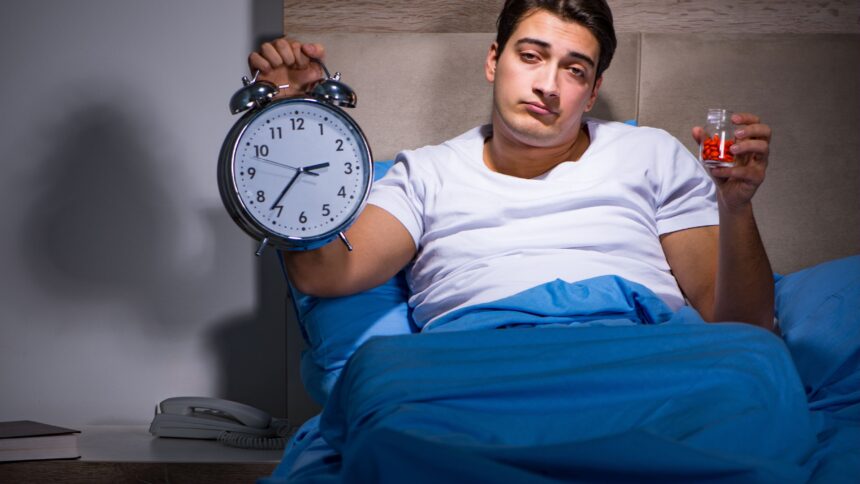We’ve all had nights when sleep seemed impossible – your mind races and your eyes remain stubbornly open no matter how tired your body feels. This frustrating experience is something many struggle with as insomnia. But there are alternatives to medication that can help you get the sleep you need.
What is Insomnia?
Insomnia refers to difficulty falling asleep, staying asleep, or both. It’s defined as experiencing insomnia symptoms at least three times per week for at least three months. Insomnia causes distress and impacts daily functioning, but its underlying causes are often complex with emotional, physical, and environmental triggers. The good news is there are effective treatments that can ease insomnia without relying solely on sleep medication.
Common Causes of Sleepless Nights
Stress is a well-known culprit – whether it’s due to work pressures, family issues, financial struggles, or current events. But chronic health conditions like pain, heartburn, asthma, or irritable bowel syndrome can disrupt slumber too. Shift work, jet lag, and even a snoring partner can interfere with restful sleep. Ironically, worrying excessively about not sleeping is itself a cause of insomnia. Identifying the trigger is a first step to addressing it in a healthy way.
The Importance of a Full Night’s Rest
We all know how crummy it feels to be exhausted, but sleep deprivation takes a serious toll. Lack of quality sleep hinders concentration, lowers productivity, and impairs decision-making. It also weakens the immune system making us vulnerable to illness. Over the long run, insomnia contributes to a higher risk of diabetes, obesity, cardiovascular disease, and even dementia. Considering sleep impacts overall health and wellness, it deserves as much focus as diet and exercise routines.
Impact on Daily Life and Well-being
Pam could barely drag herself through her workday. As a busy mom with two school-aged kids, she was already stretched thin. But with only a few broken hours of sleep each night, nothing felt manageable. Her fatigue interfered with even basic tasks like cooking dinner or doing laundry. Irritability became her default setting and it strained relationships. She realized this level of exhaustion was unsustainable unless she took action against her chronic insomnia. Developing a holistic strategy gave Pam back control over her life.
Long-term Effects of Untreated Insomnia
Without treatment, chronic insomnia can take a serious toll on health. Constant tiredness hikes stress levels and the risk of depression. Over many years, disrupted sleep patterns are linked to obesity, diabetes, high blood pressure and heart disease. Cognitive issues like impaired memory and concentration can arise too. Plus, getting five hours instead of seven every night is estimated to shorten lifespan by over a year. The good news? Gentle lifestyle tweaks and complementary therapies can help overcome insomnia triggers naturally. Prioritizing long term well-being is often motivation enough for change.
Natural Remedies for Sleepless Nights
Fortunately treating insomnia doesn’t require a lifetime of prescription drugs. Lifestyle adjustments like developing a relaxing pre-bed routine are highly effective. While they take consistency, natural remedies help many get the sleep they need without medication.
Establishing a Sleep Routine
Our minds and bodies thrive on consistency. Going to bed and waking at set times, even on weekends, helps regulate circadian rhythms for optimal sleep. Creating a soothing pre-bed routine – like a warm bath, light reading or gentle yoga stretches – tells the body it’s time to slow down. Limiting screen time, having a light snack and avoiding stimulating activities before bed also promotes drowsiness.
Creating a Sleep Sanctuary
A cozy bedroom should be dark, cool, and quiet to encourage rest. Blackout curtains, a white noise machine or even just a fan can mask distracting outside noises. Investing in a quality mattress and lightweight bedding improves comfort. Reducing blue light exposure using a red reading light or apps on electronic devices further relaxes the mind and body for slumber.
Mindfulness and Relaxation Techniques
Finding ways to mentally unwind before bed is key. Gentle yoga moves unwind tension. Mindfulness meditation helps quiet a busy mind. Deep breathing slowly releases stress one inhale at a time. Visualization or guided imagery transports awareness to a peaceful place. And keeping a worry journal by the bed stops insomnia-fueling thoughts from disrupting sleep.
Diet and Exercise Also Influence Sleep
The right nutrition supports healthy sleep, while too little activity can disrupt it. Eating a light, protein-rich snack before bed provides steady energy, avoiding spikes and crashes. Warm milk contains tryptophan, an amino acid that induces drowsiness. Limiting caffeine, heavy meals, spicy foods, or alcohol within a few hours of bed also aids digestion and rest. Regular exercise relieves tension and improves sleep quality, but avoiding it too close to bedtime prevents stimulating the body further.
Foods to Help You Sleep
Certain edibles are quite literally sedating! Warm milk induces sleep thanks to tryptophan, a building block of sleep-promoting serotonin and melatonin. Tart cherries contain antioxidants that seem to boost melatonin levels. Nut butter like almond and peanut butter pair well with milk, providing tryptophan and magnesium. Oats incorporate both into breakfast. Even chamomile tea’s chemical compounds have well-known calming effects.
The Role of Exercise in Improving Sleep Quality
Regular physical activity like walking, yoga, tai chi or gardening boosts overall feelings of wellness. Exercise during the day or early evening releases endorphins that ease stress and tension, both enemies of restful sleep. Plus, activity raises core body temperature which naturally decreases later as part of the wind-down process. Strength training and stretches before bed can further relax muscles for comfort too. Just finish workouts a few hours before lights out to avoid energizing the body further.
Herbal Supplements and Teas

Nature provides many gently stimulating herbs that bolster sleep when consumed before bedtime. Chamomile, lavender, hops, passionflower and lemon balm soothe nerves and relax the muscles. Valerian root has been used for centuries to induce drowsiness. Research shows supplements containing these herbs effectively treat insomnia in many cases. Always check with your doctor first, especially if taking other medications.
Popular Herbal Remedies
Chamomile’s flavonoids have tranquilizing properties proven to benefit sleep. Steep one tea bag in hot water for 5-10 minutes. Lavender oil or supplement improves sleep quality when sniffed before bed or taken with water. Add 1/2-1 teaspoon of valerian root powder to warm milk or tea nightly. For passionflower, find standardized extracts containing at minimum 0.3% alkaloids for most effective results. Consistency allows safe, gentle herbal remedies to work their magic.
Safety and Efficacy Considerations
While herbal supplements may help treat occasional mild insomnia, consult a doctor first as some interactions are possible. Pregnancy, breastfeeding, and underlying health issues require extra precaution. Standardized, high-quality brands aid absorption and potency. Taking the same regimen for several weeks allows herbs to build up impact. As with any treatment, don’t rely solely on herbal preparations if insomnia persists for more than a month. Address underlying causes for lasting relief. Patience and follow-through are key when using natural therapies.
Acupuncture and Acupressure
Centuries-old practices show promise for inducing relaxation and battling insomnia. Acupuncture places thin needles into specific points to restore tranquility. Meanwhile acupressure massage uses gentle finger pressure instead of needles for a similar calming effect. Both are said to stimulate the parasympathetic nervous system that controls relaxation by releasing endorphins and serotonin. A licensed acupuncturist or massage therapist working your worry knots away may reduce psychological and physical insomnia symptoms.
Traditional Chinese Medicine Approaches
Ancient Chinese Medicine views insomnia as an imbalance, not a disease. Specific points said to regulate the liver, kidneys, and spleen play key roles in sleep. Acupuncturists target these areas using either acupuncture needles or massage. They may also provide herbal formulations tailored to a client’s constitution. While not medically proven, many report deep, restful slumber after just a few treatments with a credible practitioner. These methods are generally quite safe when practiced by a certified provider. Their gentle methods suit insomnia induced by stress and tension when used alongside other lifestyle modifications.
Cognitive Behavioral Therapy for Insomnia (CBT-I)
CBT-I effectively treats insomnia in about 80% of cases by addressing thinking patterns that distress or energize around sleep. Certified therapists help identify and modify beliefs that fuel insomnia. For example, they may help you realize anxious tossing and turning won’t ruin your day, or that spending time awake in bed isn’t “wasted.” CBT-I teaches relaxation techniques and breaks associations between bed and wakefulness by limiting time spent awake in bed. Lifestyle advice like establishing a routine rounds out the approach. Just a few sessions of CBT-I often provide long-term relief from chronic insomnia.
Understanding CBT-I
CBT-I techniques provide lifelong tools to manage insomnia fluctuations. Stimulus control methods help undo conditioned responses between bed/wakefulness. Restricting time in bed initially may feel depriving, but training sleep efficiency restores function. Relaxation training quiets chatter and calms nerves. While commitment is key, giving these methods a faithful try often lifts the burden of insomnia for good.
Light Therapy
Sunlight regulates our body clocks through pupil responses. Using artificial light mimics effects of dawn/sunset to stabilize circadian rhythms. As natural light wanes in winter, this tool helps overcome seasonal affective disorder (SAD) and associated insomnia. Bright light therapy uses specialized lamps providing 10,000 lux for 30 minutes daily, ideally in morning. Unit placement depends on your visual angle – ask providers. Consistency is key, though most notice improved rest within 2-4 weeks of beginning treatment.
How Light Influences Sleep Patterns
Our sleep-wake cycle follows the rise and fall of light levels throughout the day. At night, melatonin production increases in absence of light cueing the body for rest. But in winter months or living/working indoors, we don’t receive as much bright light exposure to synchronize our circadian rhythms. Light therapy provides this stimulus through a special lamp to boost daytime alertness and ease SAD/insomnia tied to shorter daylight hours. Placing oneself directly in front of the lamp helps set the body clock.
Using Light Therapy to Regulate Sleep Cycles
SAD and circadian rhythm disruptions hit hardest in winter as days grow shorter. Sitting about 18 inches from a 10,000-lux daylight simulation lamp for 30 minutes upon waking mimics sunrise. This jumpstarts cortisol and boosts mood/energy. Some opt to use a smaller light box periodically through day as well. Most feel improvement in just 1-2 weeks, with relief lasting all season when maintained daily. While not a permanent cure, light therapy bridges low-light months supporting restful sleep and well-being.
Relaxation Techniques
When tense muscles and racing thoughts keep us awake, relaxation methods work wonders. Progressive muscle relaxation involves systematically tensing then releasing each major muscle group to induce a state of deep calm. Deep breathing focuses awareness on breath sensation rather than stressful internal chatter. Guided imagery takes the imagination to a soothing virtual landscape like a beach or forest. Yoga poses, gentle stretching or meditation may help too. Even just 5-10 minutes of these practices before bed promotes relaxation over excitation. By associating bed with serenity instead of stress, we retrain our brains for better sleep.
Progressive Muscle Relaxation
This simple practice starts at the toes, tensing then relaxing each muscle area sequentially all the way up to the face. Tensing areas like thighs, back, shoulders, etcetera for 5-10 seconds followed by deep exhalation releasing tension trains the body to let go. Regular PMR like before bath or brushing teeth makes relaxation an automatic reaction. It also breaks thought patterns interfering with sleep by bringing awareness to physical sensations instead. Over time these techniques increase body awareness helping spot and diffuse tensions developing again during the night.
Deep Breathing Exercises
Conscious breathing is a potent relaxation tool. It exercises our parasympathetic nervous system activated during rest. Focusing only on the breath, rather than problems, releases tension in muscles throughout the body. This basic yoga breathing exercise involves inhaling through the nose slowly, filling the belly before chest with air, and exhaling deeply through the mouth. Place hand on stomach to feel it rise and fall. Five minutes is all it takes to quiet a busy mind and prepare for rest. Practicing deep breathing anywhere reduces stress that disrupts sleep, giving it a try in bed aids effective transition to slumber.
Limiting Screen Time
While shows and games entertain us, screens stimulate the brain in ways that sabotage slumber. Light emitted from devices disrupts melatonin levels needed to feel tired. Their content engages brain regions involved in attention and problem-solving instead of rest. Cutting off-screen use at least 1-2 hours before bed allows natural unwinding. Downloading apps and adjusting display settings on phones/tablets that alter lighting hues for evening can minimize blue light effects as well. With screens out of the bedroom, environment better supports much-needed rest.
The Impact of Screens on Sleep
Not only is the blue light from electronic devices disruptive to melatonin production and circadian rhythms, but the content viewed can overstimulate the brain. Exciting shows, games, social media and work correspondences activate centers involved in attention, problem-solving and stress responses. This counteracts the relaxation needed to transition to sleep. By limiting screen time before bed, we avoid priming the mind and body for activity rather than rest.
Strategies for Reducing Screen Time Before Bed
Some options include setting an end time for device usage such as finishing at least one hour before planned sleep. Switching to offline hobbies like reading, journaling or drawing provides calm stimulation instead. Adjusting display settings on phones/tablets to alter lighting hues warmer for evenings can help as well. Downloading apps that monitor screen time aims to build new habits. With screens out of the bedroom, our environment promotes better relaxation and dozing off. Over time, limiting digital distractions forms conducive conditions for catching crucial zzz’s.
Avoiding Stimulants and Alcohol
While caffeine and other substances artificially energize us, too little sleep is equally stimulating. Caffeine’s half-life averages 5-6 hours, so it’s best avoided by 3pm. Although alcohol is sedating, it hinders quality REM sleep. Nicotine isn’t a stimulant per se, but its cravings can interrupt slumber. Managing legal and illegal drug intake plays a role as substances disrupt neurotransmitters affecting mood, focus, and relaxation. Understanding substances’ sleep-interfering properties allows incorporating them appropriately.
Understanding the Effects on Sleep
Caffeine and other stimulants like nicotine artificially jolt our nervous system through receptors impacting cortisol, dopamine, adrenaline and other hormones. Their effects linger hours after consuming delaying quality relaxation and diminishing sleep drive. Meanwhile alcohol may induce slumber faster, but it fragments rest through REM sleep suppressions preventing truly rejuvenating rest. We must respect substances’ disruptive properties through moderate, well-timed use preserving natural sleep-wake balance.
Tips for Limiting Consumption Before Bedtime
For caffeine aim to finish your last cup by mid-afternoon. Avoid heavy or spicy meals close to bed which can cause indigestion. Drink mostly water in evenings. Space alcoholic drinks so effects have worn off by sleep time. Try relaxing herbal tea instead of caffeine or limiting nicotine/marijuana in evenings. Gradually reduce stimulant exposure to better support sleep without artificially induced energy or sedation. Our bodies will thank us with deeper, more restorative rest.
The Importance of Stress Management
Physical and emotional stress exact a heavy sleep debt through disrupted circadian signaling. Heightened sympathetic nervous system activity from worrying, difficult emotions and excess tension does the opposite of unwinding the mind and body. Low-intensity exercise, deep breathing, muscle relaxation, soothing baths, and meditative practices counter stress’ excitatory influence over the brain and body to reduce insomnia symptoms. Having consistent methods ready helps cut stress at the pass, giving zzz’s the green light.
Stress and Its Impact on Sleep
We evolve to meet threats vigorously, not slumber. The physiological excitation stress triggers continue hours post-event disrupting relaxation cues like melatonin needed for rest. Physical tension develops as muscles prepare for “fight or flight.” Cognitively, overactive thinking patterns related to stressors activate areas linked to alertness versus rest. Long-term, a taxed nervous system elevates risks for health issues including insomnia. Gentle stress dissipation techniques reverse this influence.
Effective Stress Reduction Techniques
Establish a calming routine like a warm bath, light yoga or soft music relaxation. Deep breathing alone goes far in defusing tension. Journaling or talking through feelings processes emotions slowing worry trains of thought. Spending time in nature basks mind and body in restoration. Having friends /family for laughs lifts perspective away from problems. Meditation trains attention away from stressors toward harmony within. Gratitude practices too reinforce positivity over negativity. Combining methods best unknots anxiety’s hold over sleep.
Alternative Therapies
For stubborn insomnia not easing with lifestyle tweaks, some alternatives complementarily address deeper root issues with proper guidance. Hypnosis harnesses imagination’s relaxing influence. Aromatherapy relies on botanical fragrances’ hypothalamic impacts. Consult credible practitioners versed in safety/efficacy to explore these additional tools responsibly, wisely and temporarily as a last-line treatment rather than replacement for lifestyle remedies or medical care when indicated. Though varied, addressing underlying factors allows lifting insomnia’s burden naturally.
Hypnosis
This process makes use of imagination’s relaxing influence over the conscious mind and body. A certified hypnotherapist guides deep relaxation and focuses imaging’s suggestibility properties to reframe thought patterns impacting sleeplessness. Sessions may suggest easier transitions to slumber, limiting caffeine’s stimulating effects, or associating bed exclusively as a place for rest. While not fully understood, hypnosis seems effectual for certain types of insomnia in short term with proper training/delivery from qualified professionals.
Aromatherapy
Specific essential oils applied or diffused near the bedtime enhance relaxation through aroma. Lavender has long been cherished for unwinding nerves and calming overactive thoughts. Bergamot, chamomile and ylang ylang emit scents signaling to the brain it’s time to slow down as day winds to a close. Using 2-3 drops on the pillow or in a diffuser takes advantage of botanicals’ direct hypothalamic impacts on mood and sleep regulating neurotransmitters. While not a standalone remedy, incorporating aromatherapy deepens the relaxation response supporting natural insomnia solutions when used judiciously alongside other lifestyle changes as preferred.
Seeking Professional Help
Attempting natural cures for a month without success indicates factors beyond willpower at play. Consulting a medical provider rules out underlying conditions and identifies proper expertise. Family doctors often recommend cognitive behavioral therapy or prescribe sleep hygiene programs first. Should insomnia persist, a sleep specialist can perform a polysomnogram sleep study discerning issues. They may suggest additional therapies like acupuncture, light therapy, or temporary pharmaceutical aids until triggers get addressed holistically. No one should suffer insomnia alone when compassionate assistance exists. With patience and teamwork, we find the tailored solution empowering better rest.
When to Consult a Healthcare Provider
Insomnia lasting over a month signals the need for evaluation, especially if accompanied by concentration/memory issues, mood changes or multiple failed remedies. Other red flags include very early-morning waking, daytime sleepiness interfering with tasks, and underlying conditions like PTSD or chronic pain potentially exacerbating symptoms. A medical provider rules out physical causes and creates an appropriate treatment plan in collaboration with the individual’s needs, goals and risk factors like medical/family history. Together the right solution emerges.
Treatment Options Beyond Natural Remedies
Should lifestyle modifications and adjunct therapies prove insufficient long-term, additional options exist under medical guidance. Prescription sleeping pills may provide temporary relief until underlying triggers get addressed to avoid developing dependency. A sleep specialist can perform evaluations for conditions masquerading as insomnia, determine best behavioral options like CBT-I therapy involving 6-8 sessions, or evaluate for circadian rhythm disorders benefitting from supplemental light therapy or melatonin. Alternative techniques like myofascial release massage address muscle-related insomnia effectively and holistically. By keeping an open, hopeful, and proactive perspective, relief comes within reach.
Conclusion
With diligence and the right treatment approach tailored uniquely for each individual, overcoming insomnia naturally is certainly possible. While sleep medication has its place, gently modifying daily habits empowers us to take control sustainably without long-term reliance. Remember, facing insomnia bravely and seeking wise counsel honors our shared wishes for health, restful nights, and days brimming with boundless energy. With small changes and consistent effort, we restore rejuvenating sleep and live fully awake. Choosing natural treatments may require commitment, though relieve fatigue while supporting wellness from within.




